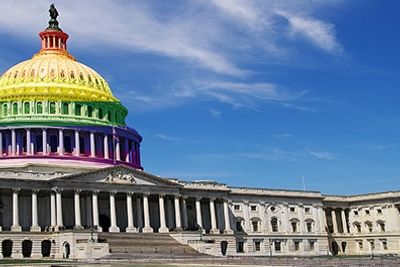By Steve Kilar, January 2019 Issue.
A few weeks ago, The New York Times broke the news that Donald Trump’s Department of Education is hoping to redefine “sex” in federal education law in a narrow way, to give legal cover to public schools when a transgender student is mistreated.
If the administration were to follow through, it would be the equivalent of the federal government shutting its eyes and plugging its ears when transgender students reach out for help.
The Times bulletin was not a surprise. From its earliest days, the Trump administration has attempted to roll back protections for transgender people and advance the incorrect notion that gender is a binary based a person’s genitalia and chromosomes.
For instance, Trump rescinded Obama administration guidance about how schools can affirm and support transgender students. Another example: Trump is attempting to bar transgender people from the military. And Trump’s Department of Justice argued before the U.S. Supreme Court that businesses should be able to discriminate against transgender customers.
The list goes on. It’s so long that the National Center for Transgender Equality calls Trump’s tenure “The Discrimination Administration.”
But just because this Department of Education news was yet another tally on Trump’s anti-trans scorecard, it isn’t any less harmful. Trans Lifeline (877-565-8860), a telephone support line staffed by trans-identified people, received four times its normal number of callers on the day after the Times story broke.
That’s why it’s time to act — and not just by calling and emailing the Education Department in protest.
Let’s take some time to educate ourselves on how we can affirm transgender students. Parents who have school-aged children, teachers, and school administrators, especially, can have a huge impact on future generations of transgender people by understanding how to create safe and supportive learning environments. Because no matter what the Trump administration says, schools can choose to do right by their transgender learners.
I recently took my own advice and enrolled in an online continuing education program offered by Arizona State University, called the Transgender Education Program. The program uses video interviews of parents and transgender students, as well as evidence-based lectures, to educate people about what it means to be transgender and how school communities can support transgender students.
The course, which takes the better part of a day, addresses important terminology about gender, uses real-life stories to help participants understand the experiences of transgender students, and discusses the legal obligation public schools have to provide all students with a safe learning environment.
The lessons the course provides are invaluable and could save lives. A study by Professor Russell Toomey at the University of Arizona published in the journal Pediatrics in October confirmed that about half of transgender male teens and 30 percent of transgender female teens have attempted suicide at least once. The same is true for more than 40 percent of young people who identify as non-binary.
The course teaches concepts that range from simple — for instance, teachers should not use gender to assign children to groups or activities — to complex, including how a school or district might go about adopting gender identity nondiscrimination policies. The course closes with a module that lays out how to develop a Transgender Support Action Plan, which is a personal outline of how the participant will change their behavior to become more inclusive of all students, regardless of their gender identity.
The fight for equality for transgender people is not a fight against Trump alone. There are a lot of people in Arizona who share Trump’s destructive, anti-trans bias. For example, Arizona Attorney General Mark Brnovich joined a lawsuit challenging the trans-affirming school guidance put forth by the Obama administration. Great Hearts Academies, a public charter school group with more than 20 schools in Arizona, adopted — and later revised, after public outcry — a policy that denied transgender students their dignity. These examples are among the reasons why it’s so important for us to act locally.
If we all take time to learn about creating affirming environments for transgender students and share what we learn with others, we can have a huge impact in our communities.
In the meantime, it’s important to also spread the word that transgender students, and transgender people in general, have rights. Federal civil rights laws prohibit sex discrimination by employers, schools, landlords, and health care providers. Transgender people who face discrimination in one of these contexts should consult a legal organization like the ACLU, Lambda Legal, or the Transgender Law Center.
From Arizona State University: “The Transgender Education Program© is a new professional learning opportunity for K-12 educators created at Arizona State University that focuses on the social, emotional, and educational needs of transgender students. The Transgender Education Program© is designed to provide educators with the knowledge and understanding they need to help transgender students be successful in school and to promote affirming schools where all students learn and thrive.”
Learn more at: theconnectcenter.asu.edu/project-connect/trans-ed-program
